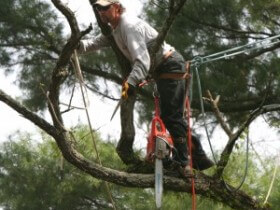Make sure you take care of your garden the best you can. Here is where intelligent gardening techniques will come in useful. Following organic horticulture practices will result in tastier fruits and vegetables, as well as happier plants. The tips in this article should start you on the road to doing just that with a successful organic garden.
It can be very hard to shovel clay soil, especially when it sticks to your shovel as you are working. Rub a thin layer of floor or car wax over the surface of the shovel, and then buff the surface using a clean cloth. This will make shoveling in clay soil easier. The wax will help keep dirt from sticking to the shovel, and will also keep the metal from rusting.
Plant perennials that are resistant to slug and snail infestations. A particularly vulnerable plant can be killed by snails and slugs overnight. These pests are especially attracted to tender sprouts and to delicate, soft leaves. Perennials with hairy, tough leaves as well as those with unpleasant taste are not appetizing to snails and slugs. Achillea, euphorbia, helleborus, heuchera and campanula are good choices that slugs don’t like.
Use both annuals and biennials to add a splash of color to your flower beds. The annuals and biennials are usually fast growing because they only last one season, and this will let you change the garden every season for a nice change of pace. In an area that is sunny, they make good plants to place in the gaps found between shrubs and perennials. Some examples include sunflowers, marigolds, petunias, hollyhocks, cosmos, and rudbeckia.
Plants need ample amounts of CO2 to reach their maximum growth. When exposed to high levels of CO2, most types of plants will grow better. A greenhouse is the best way to create an environment rich in CO2. In this environment, the CO2 levels are kept high so the plants can experience optimal growing conditions.
Kill Weeds
Be sure to weed your garden. Weeds can take over a healthy garden faster than you think. White vinegar has been known to kill weeds quickly. Use it instead of chemical solutions to kill weeds. Load up your spray bottle with some white vinegar, and spray the weeds away instead of breaking your back removing them by hand.
Shelter your deciduous shrubs. Tender, potted shrubs must be protected when the weather is cold. First tie together the tops; then take a sheet or blanket and loosely shroud the wigwam. This is a much better method, instead of putting the plastic wrap around the plant. It allows proper air circulation that can prevent rotting.
Fresh mint is a wonderful addition to a herb garden, but it can quickly take over your entire yard. Keep your mint growth under control by planting them in pots and/or garden containers. You can even plant the container in the ground. That way, the roots won’t be able to escape the container, and the plant won’t overrun your garden.
Know the ideal times to harvest each of the vegetables you plant. Each veggie has its own prime time for harvesting. For instance, zucchini and baby peas will taste a lot better if you pick them when they are young. In contrast, tomatoes are best when left on the vine as long as possible. Take the time to learn when your produce will be at its best for harvesting.
Organic gardening makes a huge difference in the taste and freshness of your produce. It does take work and patience, but all is worth it come mealtimes that include your organic, homegrown produce.
Given your new base of information on mdyhome.com, start putting it to use. Try to get all of the fundamental knowledge in place before you apply it. You’ll be a pro in no time with this great info.




